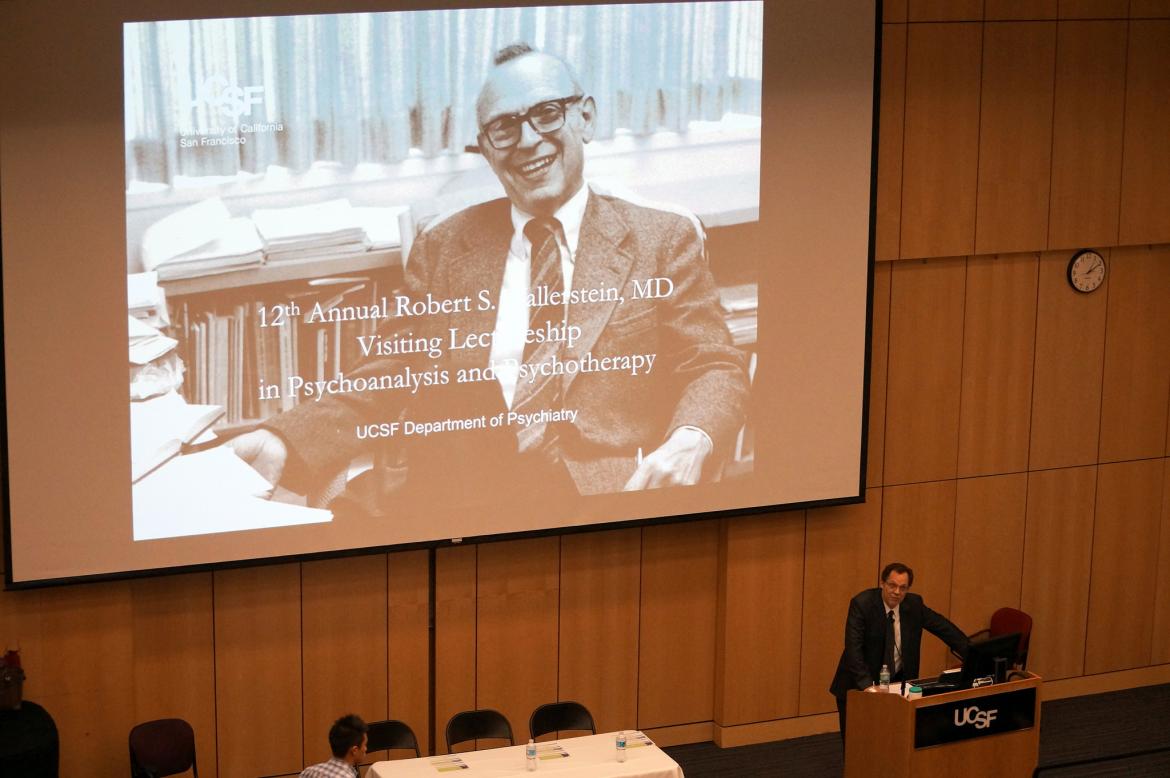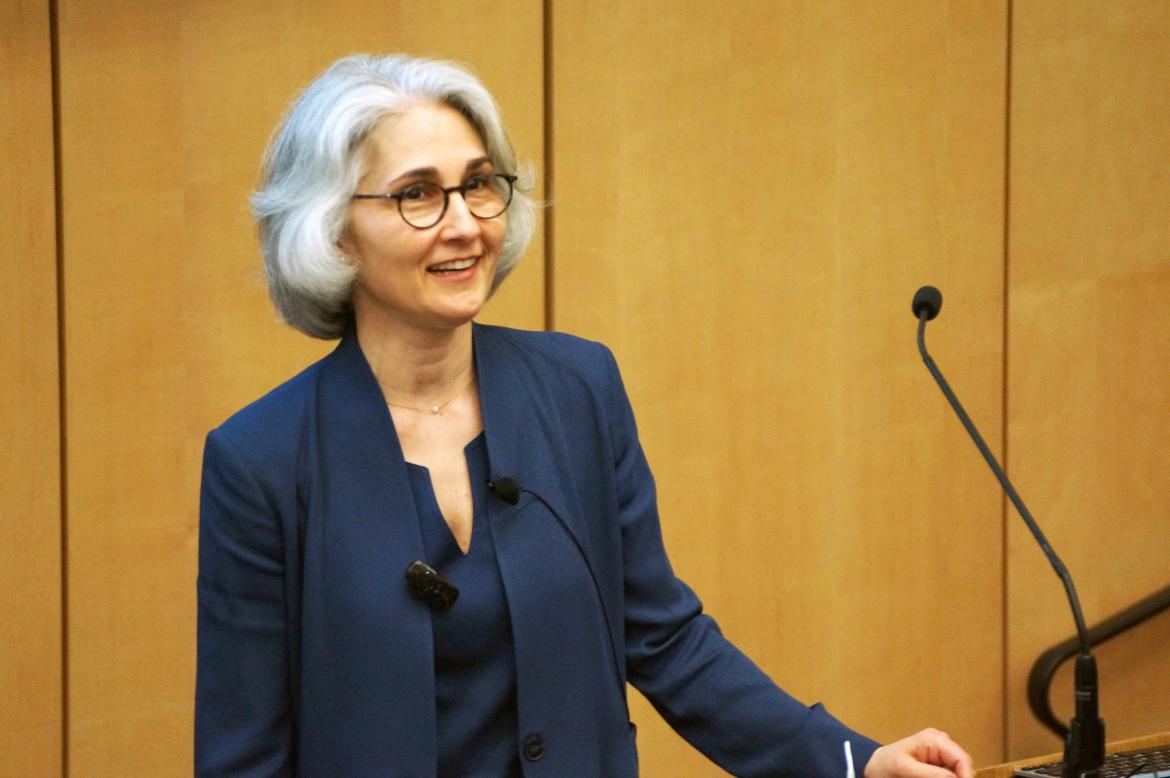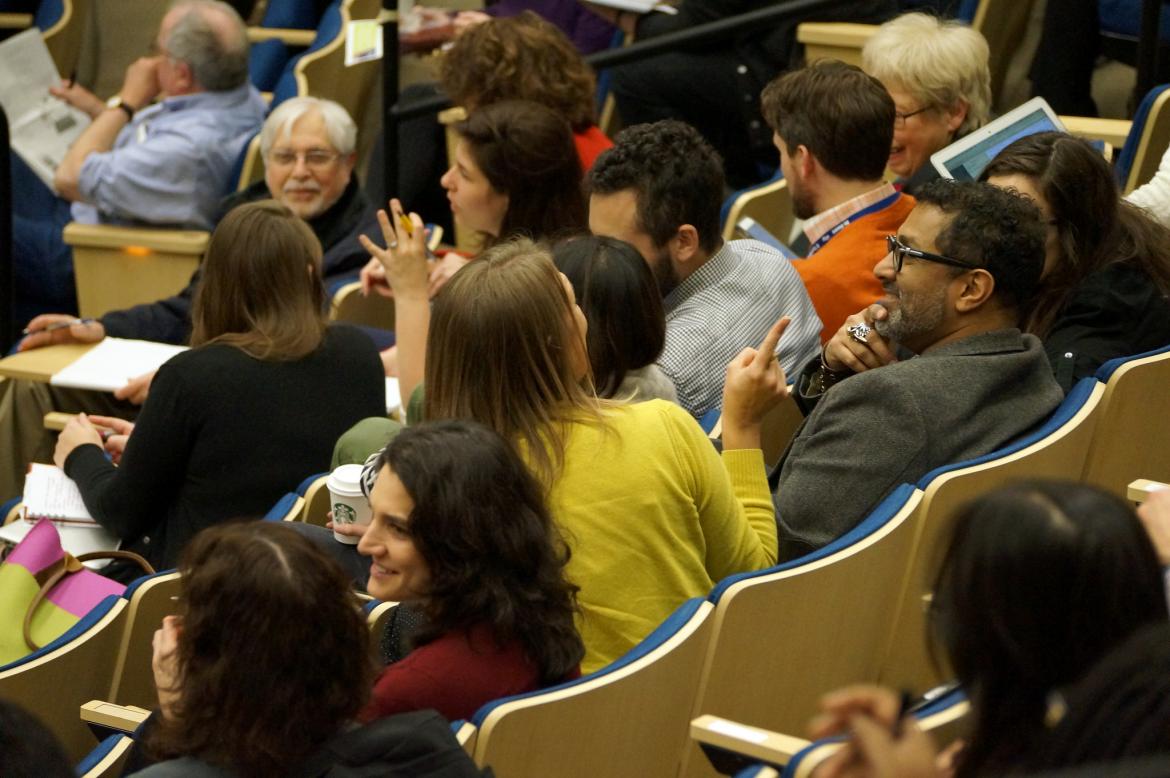By Nicholas Roznovsky
Faculty members, trainees, and clinicians from around the Bay Area gathered in Cole Hall last week for the 12th annual Robert S. Wallerstein, MD Visiting Lectureship in Psychoanalysis and Psychotherapy.
Noted clinical educator and author Deborah L. Cabaniss, MD, delivered the keynote address focused on the challenges and opportunities educators face when teaching psychodynamics to trainees. Cabaniss, a professor of clinical psychiatry at the Columbia University College of Physicians and Surgeons, then gave a live teaching demonstration during which she appraised the clinical performance of a trainee and offered constructive feedback. Analysis and commentary on Cabaniss’ keynote address and training presentation were provided by by William Wolfe, MD, Adam Goldyne, MD, and Mary Margart McClure, DMH.
Each year, the UCSF Department of Psychiatry invites a distinguished scholar to speak on campus as part of the Robert S. Wallerstein, MD Visiting Lectureship in Psychoanalysis and Psychotherapy. This lecture series is held in honor of the late Robert S. Wallerstein, MD, and is focused on showcasing psychoanalytic knowledge and clinical expertise that influence psychiatry, psychotherapy and psychoanalysis. Former recipients include Otto F. Kernberg, MD, Peter Fonagy, PhD, FBA, and Regina Pally, MD.
The entire event is available to watch online and photos are now available on the Department of Psychiatry Flickr site.

William Wolfe, MD, welcomes the audience to the 12th Annual Robert S. Wallerstein, MD, Visiting Lectureship in Psychoanalysis and Psychotherapy. [Photo: Nicholas Roznovsky]

Deborah L. Cabaniss, MD, delivers her keynote address, "Teaching Psychodynamics: Today and Tomorrow," at the 12th Annual Robert S. Wallerstein, MD, Visiting Lectureship in Psychoanalysis and Psychotherapy. [Photo: Nicholas Roznovsky]

Audience members take part in a partner discussion exercise. [Photo: Nicholas Roznovsky]

Deborah L. Cabaniss, MD, (right) discusses her presentation with discussants Adam Goldyne, MD (left) and Mary Margaret McClure, DMH (center). [Photo: Nicholas Roznovsky]
About UCSF Psychiatry
The UCSF Department of Psychiatry and the Langley Porter Psychiatric Institute are among the nation's foremost resources in the fields of child, adolescent, adult, and geriatric mental health. Together they constitute one of the largest departments in the UCSF School of Medicine and the UCSF Weill Institute for Neurosciences, with a mission focused on research (basic, translational, clinical), teaching, patient care and public service.
UCSF Psychiatry conducts its clinical, educational and research efforts at a variety of locations in Northern California, including UCSF campuses at Parnassus Heights, Mission Bay and Laurel Heights, UCSF Medical Center, UCSF Benioff Children's Hospitals, Zuckerberg San Francisco General Hospital and Trauma Center, the San Francisco VA Health Care System and UCSF Fresno.
About the UCSF Weill Institute for Neurosciences
The UCSF Weill Institute for Neurosciences, established by the extraordinary generosity of Joan and Sanford I. "Sandy" Weill, brings together world-class researchers with top-ranked physicians to solve some of the most complex challenges in the human brain.
The UCSF Weill Institute leverages UCSF’s unrivaled bench-to-bedside excellence in the neurosciences. It unites three UCSF departments—Neurology, Psychiatry, and Neurological Surgery—that are highly esteemed for both patient care and research, as well as the Neuroscience Graduate Program, a cross-disciplinary alliance of nearly 100 UCSF faculty members from 15 basic-science departments, as well as the UCSF Institute for Neurodegenerative Diseases, a multidisciplinary research center focused on finding effective treatments for Alzheimer’s disease, frontotemporal dementia, Parkinson’s disease, and other neurodegenerative disorders.
About UCSF
UC San Francisco (UCSF) is a leading university dedicated to promoting health worldwide through advanced biomedical research, graduate-level education in the life sciences and health professions, and excellence in patient care. It includes top-ranked graduate schools of dentistry, medicine, nursing and pharmacy; a graduate division with nationally renowned programs in basic, biomedical, translational and population sciences; and a preeminent biomedical research enterprise. It also includes UCSF Health, which comprises top-ranked hospitals – UCSF Medical Center and UCSF Benioff Children’s Hospitals in San Francisco and Oakland – and other partner and affiliated hospitals and healthcare providers throughout the Bay Area.





